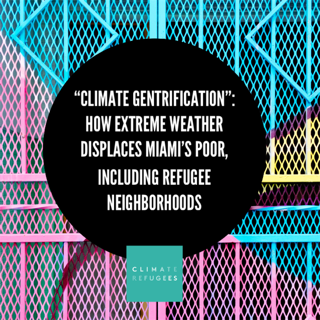In a report to US Congress last July, the US Government Accountability Office (GAO), recommended establishing a climate migration pilot program to assist communities that seek to relocate as a climate resilience strategy.
Key amongst their findings was the lack of federal leadership, namely the lack of a federal agency with authority to lead on climate migration. This has led to ad-hoc federal support to communities in need of climate migration, like Isle de Jean Charles in Louisiana, who have been waiting many decades to relocate, and Newtok, Alaska, who waited 25 years for only some residents to move in 2019.
The GAO is not alone in its assessment. Wondering why Newtok took so long to see movement, NPR found “part of the reason is that the federal government has no comprehensive policy — or funding — to relocate communities bearing the brunt of climate change.”
A recent opinion piece in The Hill by researcher Victoria Herrmann reflects these gaps by calling for a climate migration coordinator to join the already assembled high-profile team assembled on climate change.
At Climate Refugees, we certainly welcome this call, especially given one million disaster-related displacements have occurred in the US since 2016. Pursuing voluntary relocation through a streamlined and coordinated process will certainly make people safer, but this process must also ensure the rights and protections of vulnerable people and relocated communities, along with their consent and participation.
In the quest to safeguard, a whole suite of rights - economic, social, cultural, even civil rights - can be overlooked without holistic thinking. For example, it’s important to think about whether new locations afford people access to schools, jobs, transportation, services, abilities and access to retain cultural rights.
Newtok and Isle de Jean Charles are two Indigenous communities that have been forced to pursue relocation for decades as a result of climate change, and while waiting to relocate, their lives and rights have eroded.
Now with relocation, will their social rights, cultural rights, right to land, right to prior participation and free, prior and informed consent, a right especially enshrined in the UN Declaration on the Rights of Indigenous Peoples, be protected in both the pre and post relocation efforts?
Equally important is to ensure that planned relocation policies do not inadvertently pursue climate gentrification - a process that allows those with access and resources to move to less vulnerable areas, and in the process, increasing costs that potentially lead to displacement of existing residents - as we have previously examined in Miami.
Dr. Herrmann, who is President and Managing Director at The Arctic Institute and an assistant professor at Georgetown University, argues that creating a Climate Migration Coordinator is imperative if the US is to adequately adapt to climate change. It also helps continue work that began at the end of the Obama administration, when an interagency working group was convened to help assist American communities with voluntary relocation, a team that was promptly disbanded by the Trump administration.
As Herrmann notes, even in just the past four years, during which time the federal government largely ignored the hazards associated with climate inaction, the US has experienced record-breaking disasters that displaced thousands of people, from deadly fires in California to Hurricane Harvey’s path of destruction. A relaunched working group with a competent and decisive leader would certainly help “streamline relocation and promote cross-agency cooperation so communities can migrate at the pace necessary to respond to climate change.”
But in the flurry of executive orders, press releases, and op-ed pieces, we hope US leaders do not lose sight of another critical piece. Climate migrants, whether internally displaced or those who come to the US seeking refuge from dire situations abroad, must be protected by the US government, and that assistance cannot simply take the form of FEMA-led disaster assistance or small-scale relocation. Comprehensive protection measures, and a rights-based approach, will be necessary, as we recently discussed in response to a CBS Sunday Morning segment on American climate migration.
Herrmann acknowledges that while the “challenge ahead is daunting,” she is confident that Biden is up to the task of protecting the nation’s most vulnerable when it comes to climate risk and displacement. Herrmann’s cautious optimism is appropriate, given Biden’s already significant actions on climate, and she is right to call for Obama’s working group on climate relocation to be relaunched and strengthened.
As the new administration, and those working under newly appointed Special Envoy for Climate John Kerry begins the enormous task of rebuilding and bolstering US climate policy, it must also keep in mind that while many communities are vulnerable to climate risk, comprehensive US policy must also acknowledge and rectify long standing issues of environmental racism and unequal access to adaptation strategies such as relocation.
Yes, this will require cross-agency cooperation, but it will also require a social justice lens, including sustained funding for adaptive programming that is as insulated as possible from a hostile Congress or change in administration, something Herrmann has discussed in her previous work on this subject. (The Hill, NPR, Bloomberg, CNN, The Guardian, Financial Times)



